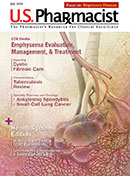Hormone therapy is the preferred treatment for premenopausal or postmenopausal women with hormone receptor (HR)–positive, human epidermal growth factor 2 (HER2)–negative metastatic breast cancer. However, many patients are treated with oral chemotherapy such as capecitabine. A phase II trial assessed the safety and antitumor clinical activity of exemestane plus a gonadotropin-releasing hormone (GnRH) agonist with palbociclib versus capecitabine in premenopausal HR–positive patients.
Many trials undertaken have been performed demonstrating that CDK4/6 inhibitor plus endocrine therapy in premenopausal women, when combined with a GnRH agonist, results in significantly longer progression-free survival. KCSG-BR15-10 was a multicenter, open-label, randomized, controlled, phase II trial conducted at 14 academic institutions in South Korea. Inclusion criteria consisted of women aged 19 years or older with HR-positive, HER2-metastatic, or recurrent breast cancer. Patients were eligible if they had received one line of therapy and had a performance status of 0 to 2, with excellent liver and renal function. Patients were excluded if they were postmenopausal or had previous treatment with an aromatase inhibitor or CDK 4/6 inhibitor or capecitabine, certain types of brain metastatic cancer, or serious or chronic infections.
Between June 15, 2016, and December 10, 2018, 184 patients were randomly assigned to either palbociclib 125 mg orally once a day for 4 weeks, plus exemestane 25 mg orally once a day for 4 weeks until disease progression, or capecitabine 1,250 mg/m2 orally twice a day for 2 weeks every 3 weeks until disease progression or intolerance to toxicity. Doses were modified for toxicities based on package-insert recommendations. The primary study endpoint was investigator-assessed progression-free survival, which was considered from the time of randomization to disease progression or death. Secondary endpoints included overall survival, quality of life, toxicity, and proportion of patients with an objective response. Median progression-free survival from randomization was 20.1 months (95% CI, 14-2:21-8) in the palbociclib-plus-endocrine-therapy group versus 14.4 months in the capecitabine group (95% CI, 0.437-0.0235). A total of 44 patients in the palbociclib + endocrine therapy group versus 47 patients in the capecitabine group experienced disease progression or died (12 patients).
In the palbociclib-plus-exemestane group, hematological toxicities were the most common adverse effects, while the capecitabine group experienced diarrhea and hand-foot syndrome as the most common side effects. It can be concluded that palbociclub plus exemestane with leuprolide prolonged progression-free survival compared with capecitabine in premenopausal women with HR-positive, HER2-negative metastatic breast cancer.
« Click here to return to Hematology & Oncology Update.






